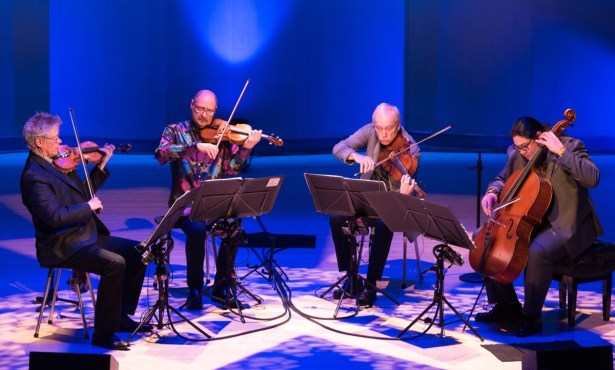Review: Juilliard String Quartet at the Lobero Theatre
CAMA Masterseries Included New and Old Works on Saturday January 17
The Juilliard String Quartet returned to Santa Barbara for the first time since 2006 on Saturday. There have been two lineup changes for the venerable group since its last appearance at the Lobero Theatre. Violinist Joseph Lin and violist Roger Tapping are the new recruits; Ronald Copes, violin, and Joel Krosnick, cello, are the veterans, with Krosnick, at 41 years in the group, the senior partner. Universally acclaimed for their performances of the classical repertoire, the Juilliards have also established themselves as advocates for contemporary composition. This concert featured the group in both modes, with the String Quartet in G Major, Op. 33, No. 5 of Franz Joseph Haydn and the String Quartet in F Major, Op. 135 of Ludwig van Beethoven performed before and after the String Quartet No. 2 “Vistas” of Shulamit Ran, which was composed in 1989.
String quartets are all about conversation. The musicians themselves often speak of the music in terms not just of phrases, but also of dialogues and even soliloquies. Beethoven famously annotated a pair of phrases in the final movement of this, his last completed work. The words Beethoven wrote mimic, in their grammatical structure, the inversion of the musical phrases they mark, with the question, “Muss es sein?” (Must it be?), soliciting its reverse as a response — “Es muss sein!” (It must be!). Predictably, musicologists have had a field day with these compositional last words, explaining them in a multitude of ways. On this night, when heard following the intricate 18th-century rhythmic surprises of the Haydn piece and the pioneering 20th-century sonorities of the Ran, the three little words of this musical dialogue sounded like Beethoven’s opinion on the great conversation of the string quartet tradition, with the verdict coming out emphatically in favor of its survival.



